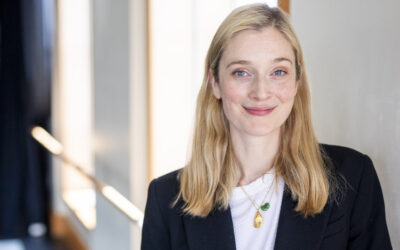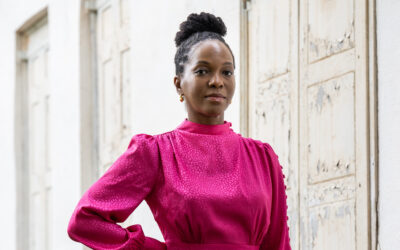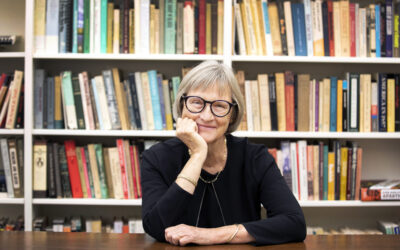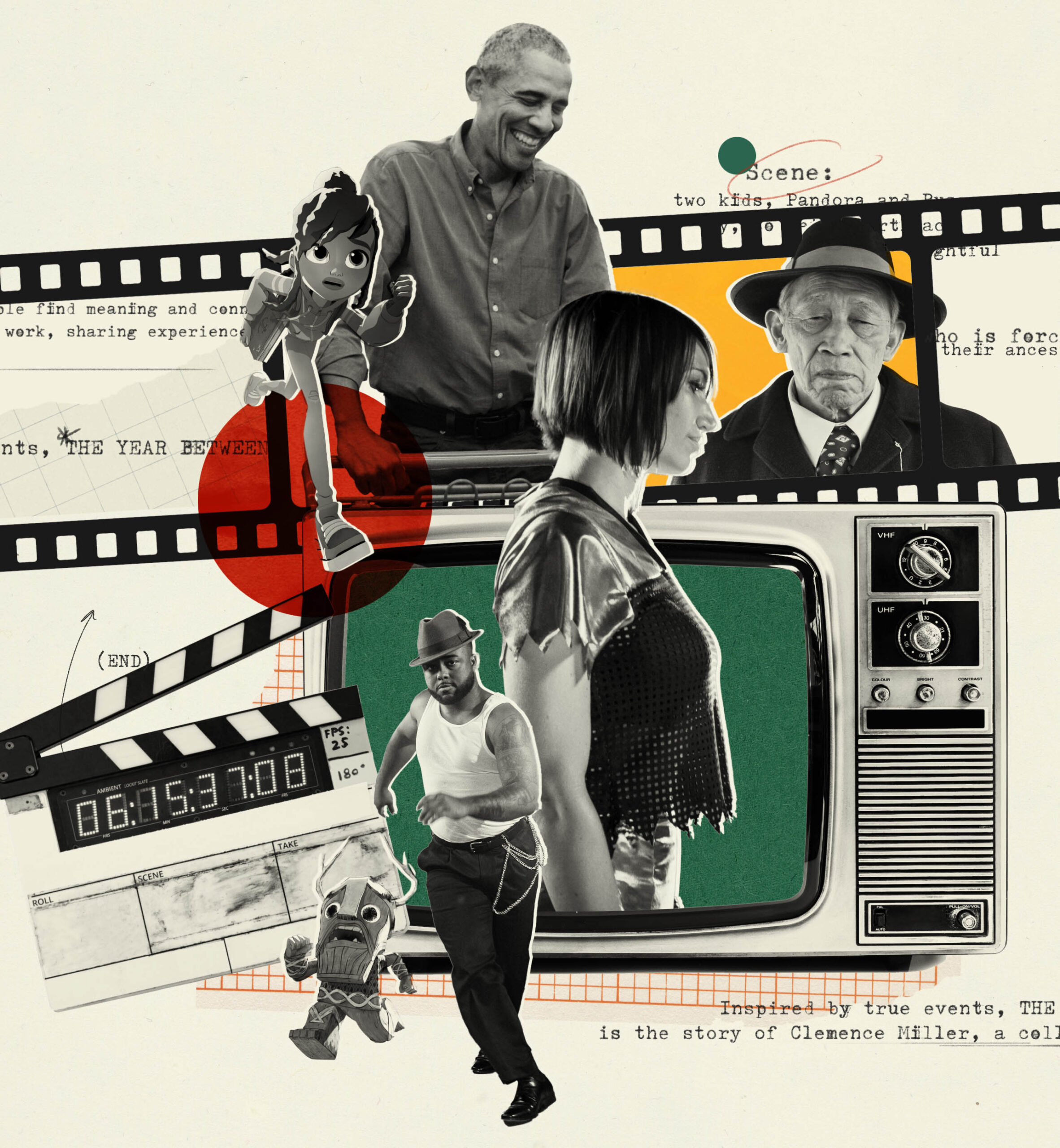
Story by Heidi Koelz | Opening illustration by Valerie Chiang
Whose Stories Get Told?
CA alums share how they create entertainment
From the winter 2024 issue of Concord Academy Magazine
February 14, 2024
There’s no shortage of movies and shows out today from filmmakers who trace their careers back to Concord Academy. We caught up with three storytellers working in film and television to ask about their recent projects and why diverse representation matters in their work.
Caroline Suh ’89 makes documentary films and series about people we don’t often hear from onscreen. Ami Boghani ’99 focuses on developing authentic, multifaceted characters. Eugene Sun Park ’96 produces narrative films that celebrate women, people of color, people with disabilities, and LGBTQ+ communities. All three underscore the importance of a variety of perspectives, backgrounds, and life experiences—both onscreen and among the creative professionals who shape what we watch.
Caroline Suh ’89
“The projects I develop come out of wanting to understand something for myself,” says Caroline Suh ’89, a New York-based director and producer of documentary films and TV series. “I’m not a journalist. I’m aware that everything I do is slanted by my own experience, and my point of view is limited.” Seeking to understand different perspectives has been the driving force behind her work.
Suh considers herself an “old-school documentary fan,” recalling the cinéma vérité classics she first saw in Chris Rowe’s class as a CA student. “To this day, one of my favorite things is to go watch a movie at an art-house theater in the middle of the day when everyone else is working,” she says.
Rowe’s students also made experimental films on Super 8 cameras. “I didn’t realize then that that’s what I wanted to do, but it was one of my fondest memories from high school,” Suh says. “CA gave me such a great foundation for figuring out what appealed to me and for finding my voice.”
She attended Columbia University, where she continued to take film courses, and worked as a copy editor for Harper’s Bazaar before earning a master’s degree in urban planning from Columbia’s School for Urban Planning and Preservation. Then she began interning at a PBS station in New York. “I started at the bottom, taking out the garbage, and I worked my way up,” she says.
The first film Suh directed, Frontrunners, about a student government election at New York’s Stuyvesant High School, came out in 2008. “It was my first time being able to do something the way I wanted, and I thought the people in it were incredible,” she says.
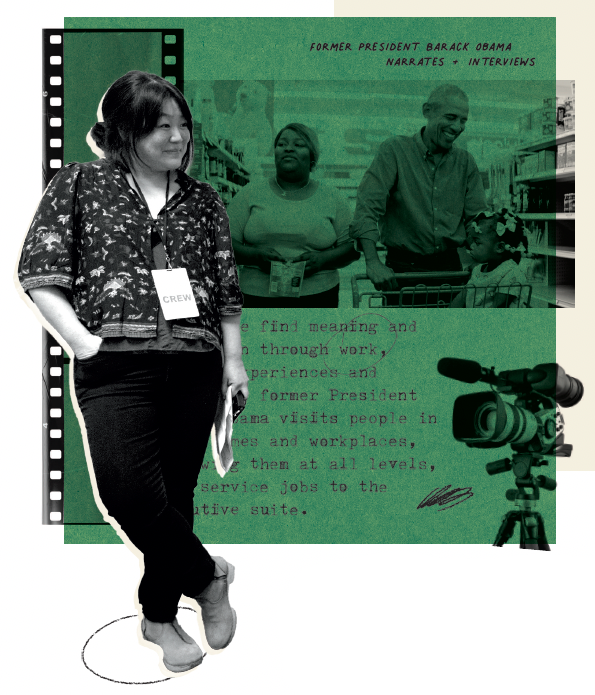
Caroline Suh ’89 on the set of Working: What We Do All Day. Behind: In a still from the series, former President Obama accompanies one of its subjects through a supermarket.
Afterward, she began producing films. “I always wanted to direct, but the industry was not necessarily set up for me to do that, or maybe I wasn’t aggressive enough,” she says. But she seized her chances and carved out a career.
Suh directed and produced the 2016 docuseries The 4%: Film’s Gender Problem, which grapples with sexism in the industry. “Working on that project, I learned about implicit bias and realized how much I’ve internalized, how it colors how I think of myself and my limitations,” she says. While making 4%, Suh says, she realized that because everyone has blind spots, “you really want a lot of different people working on films.”
She credits filmmaker Alex Gibney with giving her the chance to direct and produce some prominent documentary series for Netflix, including Cooked (2016) with journalist Michael Pollan and Salt Fat Acid Heat (2018) with Samin Nosrat, who had become renowned for her cookbook of the same name. When Suh first met Nosrat, the Iranian American chef hadn’t appeared on television before. “We approached it like an art project, which is how I like to try to approach everything I do,” Suh says.
Her throughline has been “featuring people you don’t normally hear from or see in a certain way,” she says. In Nosrat, Suh recognized an adventurous person—a capable chef who was comfortable outdoors, who could butcher meat and build fires. “Since Julia Child, a lot of the female chefs you’d see on TV would be on this kitchen set and wearing a lot of makeup,” Suh says. “We wanted to capture her naturalism.” She filmed Nosrat in Italy, Japan, and Mexico, as well as in the chef’s home kitchen in California, alongside her Iranian mother.
After those food-focused series, Suh was ready for a change. “I don’t like to do anything twice,” she says. “I never want to know exactly what a documentary’s going to be like. I try to incorporate something new with every project.”
Directing the 2020 documentary Blackpink: Light Up the Sky, she took a deep dive into K-pop. Blackpink, a South Korean girl group that skyrocketed to fame, wasn’t well known when she began the film. “While I was researching, I noticed they would all be interviewed together, so none of them got to speak in depth,” Suh says. “They were portrayed as kind of giggly, sweet dolls, and I wanted to let them talk at length and humanize them.”
She had a similar motivation while directing Working: What We Do All Day. The four-part 2023 Netflix series examines what labor is like today for people from different socioeconomic strata in America. Former President Barack Obama narrates and interviews the subjects, who hold jobs ranging from service roles to executive positions. Suh spent around four years working with him, from the project’s early development through its completion. “It was a life-changing experience,” she says. “I learned more about the world and people than I ever had before.”
“People have so much to say if you just ask them.”
—Caroline Suh ’89
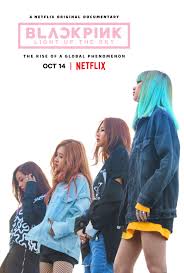
Suh’s Blackpink: Light Up the Sky presents the K-pop singers with complexity.
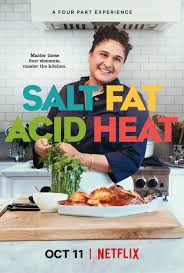
Director/Producer:
Sorry/Not Sorry
Working: What We Do All Day
Blackpink: Light Up the Sky
Salt Fat Acid Heat
The 4%: Film’s Gender Problem
Frontrunners
Cooked
Something Obama said to her early on caught her ear: that when he meets people, he finds them luminous. “As someone who is maybe a little bit cynical, I didn’t really believe it,” Suh says. “But as the project went on, I started to understand, because people have so much to say if you just ask them. People are so generous about letting you into their lives.”
The latest film Suh directed and produced, last year’s Sorry/Not Sorry, focuses on the women who accused comedian Louis C.K. of sexual harassment in the wake of the #MeToo movement. Suh says she had been a big fan of his and took up the project to better understand the social dynamics that allowed him to return to the stage so quickly. “The film really isn’t about him—it’s about the women, and it’s about the audience,” she says. “It’s about how you decide what you feel comfortable continuing to support.”
For her next project, Suh hopes to develop a narrative film about inequality, poverty, and homelessness. “It was eye-opening for me to learn about inequality in the way that I did on Working,” she says. “As I get older, I realize how little of a safety net everyone has.”
Ami Boghani ’99
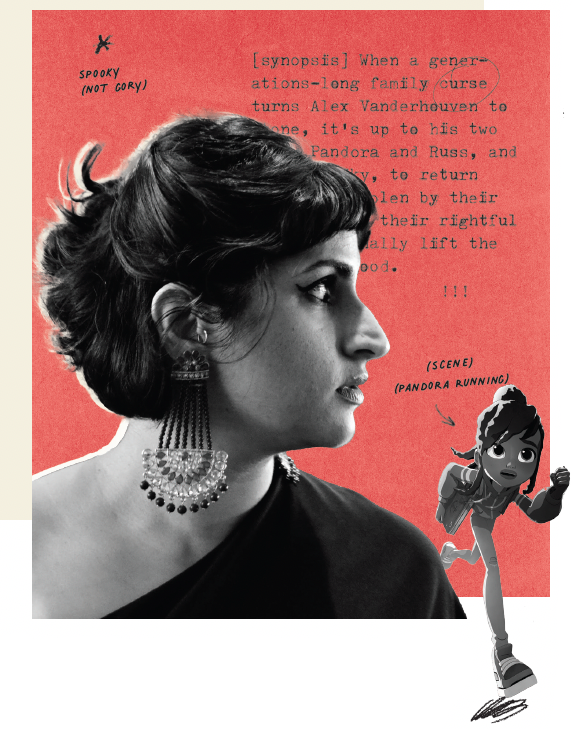
Ami Boghani ’99. Inset: Pandora, one of the teen characters on Curses!
“I learned how to be an American teenager through movies and TV,” says L.A.-based writer Ami Boghani ’99. “But I don’t yearn for the time when 50 million people tuned in to watch the same thing, because in that world there was no room for my voice.”
Growing up in the 1990s in Acton, Mass., a child of Indian immigrants, Boghani idolized shows such as Friends and Saved by the Bell. With her father—“a big film nerd,” she says—she watched ’80s science fiction, art-house fare, and a slew of Stanley Kubrick and Satyajit Ray films.
She remembers the moment she first glimpsed the possibility of a career in film and TV. She was in 10th grade at Concord Academy. Her teacher Chris Rowe taught her how to shoot and edit 8mm films and showed the class movies by Terrence Malick and Jean-Luc Godard. But it was the Beastie Boys’ low-budget video for “Sabotage” that did it.
“It was so cool—I thought it looked like something I could make,” she says. “It clicked for me that making films and videos was something a person could do for a living.”
The following year, Boghani took another class with Rowe, as well as photography classes with Cynthia Katz, and decided what she wanted to do with her life. Her advisor, José De Jesús, steered her toward Wesleyan University for its film program. “If not for CA and the people who told me this was possible for me, I would never have gone into the business,” she says.
Boghani learned a great deal about filmmaking in college, but when trying to find a job after graduating, she says, she came up hard against “industry gatekeeping.” She had moved to New York and started working on film sets when she remembered having attended a talk by Mira Nair, director of Salaam Bombay!, one of Boghani’s favorite movies, when she was promoting her 2001 film Monsoon Wedding. Nair had spoken about splitting her time between filming in India and working in Uganda and South Africa. “It was rare to be a woman of color in the field,” Boghani says. “I never saw a clear path forward in college, then I thought, ‘Oh, she’s from India, doing incredible work— maybe this is where I fit in.’”
From a film festival’s mailing list, Boghani learned about an opening as Nair’s assistant at Mirabai Films; she applied and got the position. “It was a dream come true at that point in my life,” Boghani says.
It was 2004, and Nair had recently started Maisha Film Lab, a training program for East African filmmakers. In her first year with Nair, Boghani assisted on the set of The Namesake, then in the summer accompanied Nair to East Africa. For the next eight years, she coordinated a program that supported filmmakers from Uganda, Kenya, Tanzania, and Rwanda, helping with filming, supplying equipment and editing software, and arranging movie screenings.
Boghani also co-wrote and coproduced Nair’s 2012 narrative film The Reluctant Fundamentalist, based on Mohsin Hamid’s Booker Prize-nominated novel. The story follows a suspect in a kidnapping, a Pakistani professor who once chased success on Wall Street but has returned home, bruised from how he was treated in the United States after 9/11. They filmed in Atlanta, New York, Delhi, Istanbul, and Lahore, Pakistan. “I was with Mira from the moment she optioned the book to the moment the DVD was released, so for me, it was like grad school,” Boghani says.
Writer:
Curses!
Alma’s Way
The Reluctant Fundamentalist
Co-Producer:
The Reluctant Fundamentalist
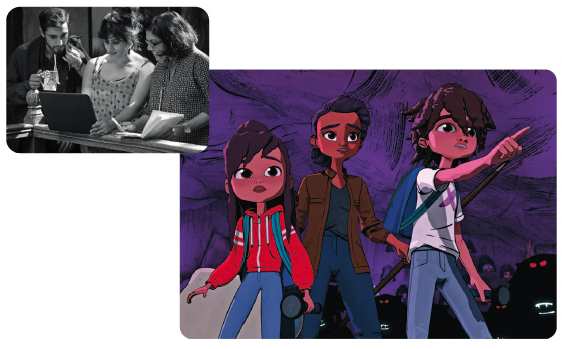
Ami Boghani ’99 on the set of The Reluctant Fundamentalist. A scene from Curses!, a series from DreamWorks Animation. Image courtesy of DreamWorks Curses! on Apple TV+.
“To be in environments that are inclusive, with other writers of color, feels new and exciting.”
—Ami Boghani ’99
After that, she felt she was ready to focus on writing her own projects. “Back then, it didn’t seem there was a way to be both Indian and American in Hollywood,” she says. “But it’s getting easier, which is amazing. I don’t feel as much pressure to choose between one culture and the other.”
The more writers can create from their own perspectives, the better, Boghani says. “Mine is not the South Asian American experience,” Boghani says. “There can be pressure to ‘get it right,’ but I think if you write characters who feel real, who are complex, then that’s just who they are. You can’t represent a whole population in one story, because we’re not a monolith.”
Boghani entered her element developing stories for young adult and middle-grade audiences. She co-authored The Never Ever Handbook for Soman Chainani’s School for Good and Evil series and has ghostwritten a Nancy Drew book. She wrote episodes for Alma’s Way, an animated series about a precocious Puerto Rican girl from the Bronx, for Fred Rogers Productions. Then she got a position in the writers’ room for the DreamWorks Animation show Curses!, which began streaming on Apple TV+ this fall.
In creating characters, Boghani focuses on making space for diversity and nuance. On Curses!, she says she hit her stride. “When you work in a creative field it can take a while to find your voice,” she says. “Now I’m trusting my instincts.”
Creators and executive producers Jeff Dixon and Jim Cooper pitched this adventure series as gateway horror (spooky but not gory). Curses! begins with an archaeologist, Alex Vanderhouven, turning to stone. A family curse is to blame; to lift it, in each episode his two kids and wife have to return an artifact Vanderhouven’s great-great-grandfather had stolen. Though that ancestor was a white colonialist, the present-day family is interracial, and the plots involve learning about diverse civilizations and navigating cultural appropriation and repatriation. “It’s like a reverse Indiana Jones,” Boghani says.
With international storytelling, teenage kids, and a chic mom in her 40s who is both a scholar and adventurer, “it ticked all of the boxes for me,” she says. “I want justice for moms in kids’ television because sometimes those characters end up being banal, and now I’m a mom and I’m extremely silly and, you know, we have personalities.”
After her stint on Curses!, DreamWorks hired her full-time as a TV development writer. Boghani thrives on collaboration, particularly in writers’ rooms. “You get access to this huge set of ideas and perspectives,” she says. “You all work together to make something. And to be in environments that are inclusive, with other writers of color, feels new and exciting for me. Creatives are weathering a tough time in the film industry right now, but I hope we can keep moving forward in terms of representation instead of trying to recreate what was popular in the past.”
Eugene Sun Park ’96
Producer Eugene Sun Park ’96 has some unusual advice for aspiring filmmakers: “Don’t study film.”
Park followed a circuitous path to founding his nonprofit production company, Full Spectrum Features, which promotes equity in the independent film industry by supporting the work of diverse filmmakers. Its award-winning films champion the perspectives of women, people of color, people with disabilities, and LGBTQ+ communities. “We need stories that celebrate the complexity of intersectionality,” Park says.
Signature Move, the company’s first feature film, from 2017, is about a closeted Muslim Pakistani lesbian who takes up lucha libre wrestling after she falls in love with a Mexican American bookstore owner. Harper’s Bazaar recently listed it as one of the 25 best lesbian films of all time. The company’s 2022 dramedy The Year Between tackles mental illness, with A-list actors Steve Buscemi and J. Smith-Cameron adding levity. Desire Lines, which won the NEXT Special Jury Award in January at the Sundance Film Festival—the company’s first foray into hybrid documentary—follows a transgender Iranian American learning about his sexuality through his archival research.
Park’s filmmaking journey began at CA, though he didn’t take a single film course. He had grown up in what he describes as a homogenous town in New Jersey, but as a boarding student—with Jordanian, Indian, German, Persian, and Indonesian friends—being part of a diverse community became paramount for him. He also fell in love with literature and writing, and he remembers in particular studying the transcendentalists with Phil McFarland P’80 ’84. “The analysis, close reading, and writing in my classes impressed upon me that literature is both enjoyable and a very serious enterprise,” Park says.
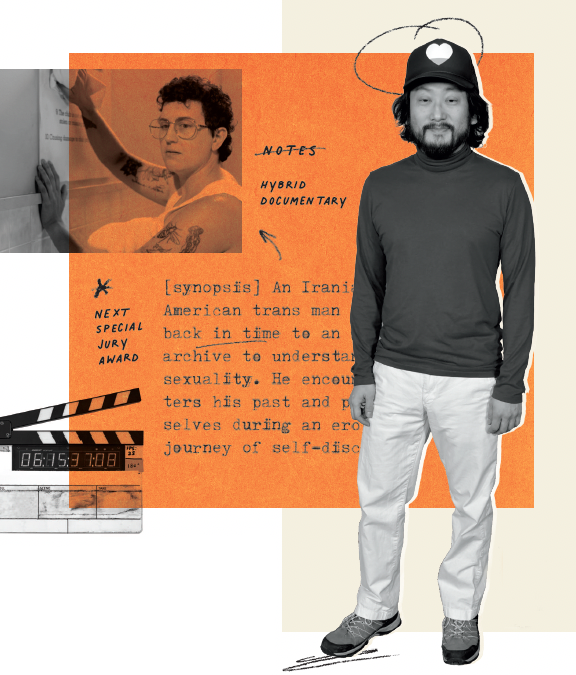
Eugene Sun Park ’96. Behind: A scene from Desire Lines.
In his senior year, CA English teacher Heyden White Rostow ’67, P’08 changed Park’s life. Bowing to parental pressure to pursue a STEM career, Park had applied early to MIT. “It hadn’t occurred to me to ask a humanities teacher for a letter,” he says. When Rostow heard his plans, she told his college counselor that he shouldn’t ignore his talent for writing. An unsolicited letter of recommendation from her accompanied his applications.
Park attended the University of Pennsylvania, initially majoring in finance and later switching to English. He recalled Rostow’s confidence in him. “It was validating that she had thought I could build a life around writing and storytelling,” he says. “At the time, I thought her insistence on lauding my writing abilities was crazy, but it stuck with me.”
After college, Park moved to Los Angeles. He worked for a couple of years as a producer’s assistant but became disillusioned with Hollywood’s commercialism and lack of genuine interest in diverse representation. So he returned to school to study philosophy, earning a master’s degree from California State University in L.A. before enrolling in a Ph.D. program at Indiana University. After five years there, he says, he felt stymied by the field’s refusal to discuss race and gender and its exclusion of the Eastern philosophical tradition. He left.
“I was overeducated and unemployable,” he says. But he had been writing fiction, creative nonfiction, and screenplays. He decided to go into film, paying little heed to how things are typically done. “Not knowing what I was doing served me well in an industry that’s broken from top to bottom,” he says.
He set up Full Spectrum Features in 2015 as a nonprofit. “Apparently you don’t do that when you make narrative films,” Park says. But he trusted his business analysis of cinema in the United States, where he says making an independent film can often cost 30 times the revenue it generates.
His approach opened doors to new funding sources. When he applied for a grant through a fiscal sponsor, a New York-based nonprofit, the National Park Service gave him a six-figure sum for one of his first films, the 2016 narrative short The Orange Story. Since then, grants totaling $2.5 million have supported seven of the company’s feature films and dozens of short films and episodic content.
Park takes issue with foundations that fund only documentaries. “Are they invested in funding a genre or in social impact?” he asks. He’s adamant that narrative films are one of the best ways to cultivate empathy across differences.
The Orange Story follows a grocer in Portland, Ore., who is forced to sell his store as the internment of Japanese Americans begins during World War II. While producing this film, Park was struck by how this history of forcible incarceration is “not holding space in the American psyche as central to U.S. history,” he says. “It’s treated as though it’s in the margin.”
That’s not for lack of access to facts, Park says, but rather because “it happened to people perceived as foreigners.” With this film, he wanted audiences to care about one Japanese American man’s sudden loss of home and livelihood. Because many more people watch narrative films than documentaries, he calls it a “Trojan horse approach.”
“We need stories that celebrate the complexity of intersectionality.”
—Eugene Sun Park ’96
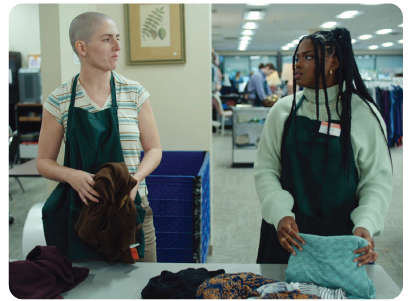
Producer:
Desire Lines
Another Happy Day
The Year Between
Brujos
I Am Not Broken
Signature Move
The Orange Story
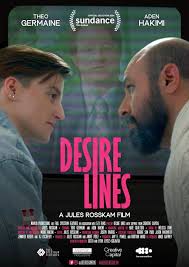
The 2022 Full Spectrum Features film The Year Between offers a distinctive perspective on mental illness. Alex Heller (left) directs and performs in this comic drama inspired by true events, which follows a college sophomore who moves back home to the Illinois suburbs after being diagnosed with bipolar disorder.
For Park, who gets to tell stories is as important as whose stories get told. “There are limitations on what you can responsibly and authentically share beyond your lived experience,” he says. It’s why he loves the flexibility of his role as a producer, which allows him to interact with a wide range of filmmakers: As of 2023, 91% of Full Spectrum Features’ directors have been women and 75% have been people of color; 55% of its actors in speaking roles have represented LGBTQ+ perspectives.
The Chicago-based company also runs Community Storytellers, a program that connects local residents with professional filmmakers who translate their stories into short films. Much of the staff is Latinx, and the program runs ads on Telemundo. “People who tell stories in narrative films often come from privilege,” Park says. “We’re missing a lot of important perspectives in American cinema when only trust-fund kids get to pursue independent filmmaking.”
If this ethos resonates today at CA, perhaps it’s because that’s where Park’s foundational belief in the power of fiction developed. “It’s where I learned to take stories seriously,” he says.
